David Theodore Dobie was born 21st October 1912 at Tynemouth, Northumberland. His father, Davis Walter Dobie, was the Director of the Tyneside Fishquay in North Shields, Newcastle. His mother was Ragna Danilsen Nilsen (1885-1970).
He was commissioned as a Second Lieutenant into The East Yorkshire Regiment (The Duke of York’s Own) on the 25th April 1936 and posted to their 4th (T.A.) Battalion. On the 25th April 1939 he was promoted to full Lieutenant.
On the 24th August 1939 his battalion was mobilized and on the 3rd September it became part of the 50th (Tyne Tees) Infantry Division with which it proceeded to France on the 26th January 1940. He saw action in the campaign of France and the Low Countries from May – June 1940 before being evacuated from Dunkirk.
On the 12th August 1940 he was promoted to Temporary Captain and then War Substantive on 28th December 1941, at the same time assuming the Temporary rank of Major. He volunteered for Airborne Forces, when the announcement was made that Britain’s parachute force was to be expanded from a Battalion to a Brigade. He was interviewed by Lt-Col. G.W. Lathbury, and selected for the 3rd Parachute Battalion, where he took up his post as ‘B’ Company Commander on the 28th September 1941, with promotion to Acting Major. He was on parachute course 2/4 Advanced and officially transferred to the Parachute Regiment – Army Air Corps on the 1st August 1942.
On the 20th March 1942 Major Dobie took his Company to Dishforth to take part in an exercise, and on the 25th March they carried out a full Company parachute drop in front of their Majesties the King and Queen at Dishforth aerodrome. David Dobie commanded ‘B’ Company on Operation ‘Torch’ in Tunisia in 1942 and throughout 1943. He was awarded the D.S.O. on the 22nd April 1943 for his actions in North Africa.
Taken ill at some stage during the North African campaign he was sent back to England, to recuperate. After recovering he was posted to the 12th (Yorkshire) Parachute Battalion, as Second in Command, within the 6th Airborne Division.
In early 1944 the 1st Battalion received a new commanding officer, but this man’s style of leadership enraged the men so much that they mutinied against him. Brigadier Lathbury intervened and transferred the commander elsewhere. As his replacement, he chose to promote David Dobie to the rank of Lieutenant-Colonel and give him command of the Battalion. Dobie was a shrewd choice as he was well known and much respected by the men of the Battalion.
At Arnhem, the 1st Battalion was charged with the task of capturing some high ground north of the town. Dobie was known to dislike his allotted objective as the Battalion was also acting in a reserve capacity and was consequently forced to remain stationary on the drop zone for half an hour. He knew that the first enemy counter attack would likely come in his direction, and this delay gave the enemy more time to react.
Upon setting out along his planned route it wasn't long before he ran into the stalled members of Freddie Gough's Reconnaissance Squadron, who informed him that heavy resistance lined the route ahead. Dobie decided to try and flank of these units by moving north, however he did not succeed in doing so and ran into several skirmishes with further German patrols. Dobie has been criticised for not proceeding along his original route, and also for not making use of the redundant Reconnaissance Squadron. This does not seem fair however, as at this stage a parachute battalion is only concerned with reaching its objective and defending it, while not getting bogged down in fighting enemy units whose purpose it was to delay the British as much as possible. Avoiding such engagements by attemping to flank them over a short and inconsequential distance was a perfectly acceptable thing to do. The Reconnaissance Squadron would have proved very useful performing their natural role of scouting ahead of advancing troops, but it is doubtful that Dobie had the authority to release any of them from their present position, nor would such permission be easy to obtain given the radio blackout. Resistance by this stage was clearly stronger than expected, but it was not believed to be anything that couldn't be handled. None of the commanders at Arnhem could have realised at this early stage how critical the situation would become.
Dobie made two attempts to get the 1st Battalion onto the Amsterdamseweg. After the first attempt failed, he moved the Battalion away from the area and led them through woodland for a mile with the hope of swinging back onto the road, but this again failed as it became clear that German armour held the road in strength. At about this time, the 1st Battalion received a radio message from John Frost, who had arrived at the Bridge and requested reinforcements urgently. Dobie sensed that his objective was becoming increasingly unrealistic, so he took the decision to change direction and head for the Bridge.
The path there was littered with obstacles, but by nightfall on Monday 18th the Battalion was near the St Elizabeth Hospital, unaware that the 3rd Battalion were nearby, but reinforcements had arrived in the form of the 2nd South Staffords and 11th Battalion, and they met up with Dobie to work out of a plan of attack. Due to his experience and being more in touch with the situation than the newly arrived CO's, Dobie was acknowledged as the leader of the group. His plan was to advance all units to the Bridge, with the 1st Battalion moving along the edge of the river while the South Staffords protecting his left flank, and the 11th Battalion followed up in the rear, acting as a reserve.
As the attack got underway, the 1st Battalion ran into members of the 3rd Battalion falling back from the area they were about to attack. One of the first officers that Dobie met was Captain Richard Dorrien-Smith, who had served beneath Dobie when he commanded the 3rd Battalion's B Company. Their conversation went something like as follows:
Dobie: Good morning!
Dorrien-Smith:Where the hell do you think you're going?
Dobie: I'm going up here.
Dorrien-Smith: I wouldn't do that if I were you. It's full of mortars and machineguns.
Dobie: How do you know?
Dorrien-Smith: Because I've bloody well been there.
Dobie: Well come and show us.
Dorrien-Smith: Not bloody likely.
With Lt-Colonel Fitch agreeing to support the 1st Battalion's attack, both heavily depleted units made promising initial progress along the lower road, but as dawn rose they came under fire from three directions and were completely pinned down. Dobie was at the front with the 6 members of R Company that remained, and as he was looking around the area for cover that his men could run to, he received a non-serious wound to his eye and arm from an exploding grenade. There was no cover nearby, so Dobie ordered his men to make for some houses over to their left. Only he and 15 others made it. Most, including Dobie himself, were captured shortly after.
Lt-Colonel Dobie's time as a POW was short. On the same day, Tuesday 19th, he was taken to the St Elizabeth Hospital to have his wounds dressed, and after his German guard took his watch and was showing it to a nurse, Dobie ran and hid in bushes outside the hospital. He made an attempt to move further, but was stopped by a German soldier, whose suspicions he managed to allay by saying "Guten Morgen". Deciding that movement during the day was highly perilous, Dobie continued to hide until nightfall, when he crossed the street and took shelter in a house that had been bombed. He slept here until he was awoken by the sound of someone trying to enter the property. Luckily for him it proved to be a Dutch doctor, who not only dressed his wounds again, but found him a bed in the house and continued to shelter him. Dobie remained here until the Battle was over and the Germans ordered that Arnhem be evacuated. He was smuggled out to Ede, where he was made welcome by more Dutch civilians.
Dobie made contact with the Dutch Resistance and played his part in planning the Pegasus I crossing on October 22nd that saw 138 men, mostly 1st Airborne, cross the Rhine and to safety. Dobie crossed the Rhine, with a great deal of difficulty, ahead of Pegasus I to make the final arrangements with Montgomery's 21st Army Group.
The Dutch awarded him the Militaire Willemsorde, 4th Class (The Dutch V.C.) by Royal Decree No 29 of 31st July 1945. It was announced in the London Gazette 20th March, 1947.
David married Rex and they had two daughters and one son.
Colonel David Dobie died in Nairobi, Kenya, 12th December 1971.
By Bob Hilton
Read More
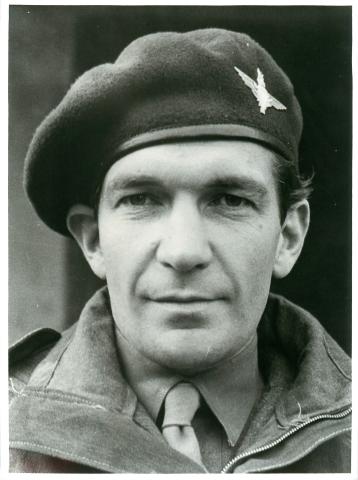
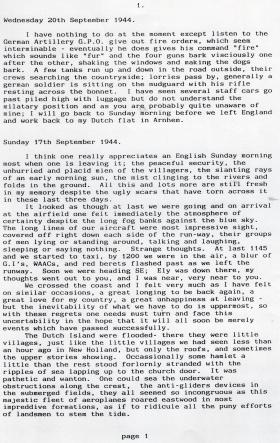
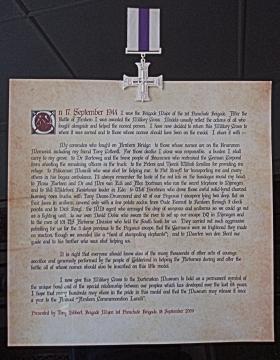
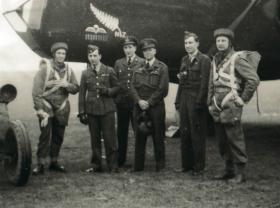
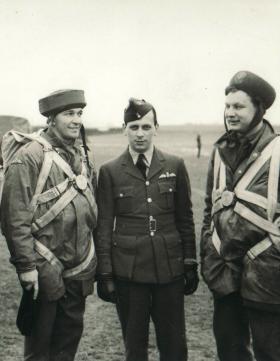
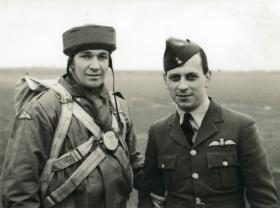
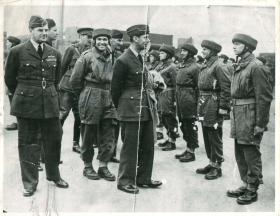
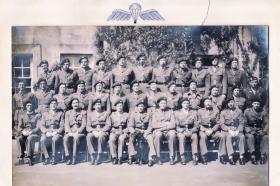
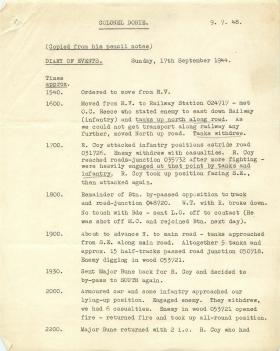
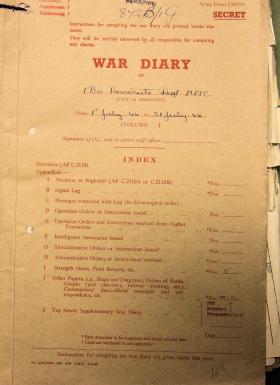
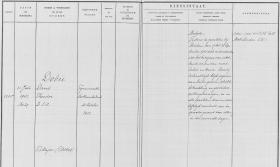
Latest Comments
There are currently no comments for this content.
Add Comment
In order to add comments you must be registered with ParaData.
If you are currently a ParaData member please login.
If you are not currently a ParaData member but wish to get involved please register.